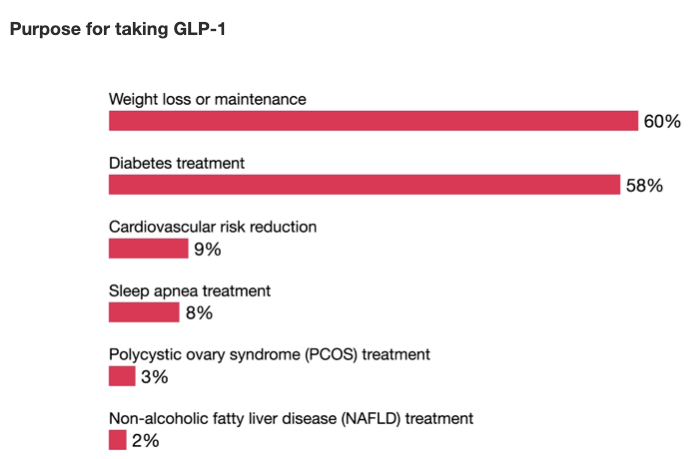
Jackie's Take: What's on My Mind in Women's Wellness ✍ 🤔 📰
The Microdosing Edit (Part 1): The WHAT🥇
Last week we opened the door on the microdosing conversation. So many of you told me you’ve wondered if a “pinch” of a GLP-1 might make sense for you, even if you never saw yourself as the typical candidate. That response confirmed what I suspected: women in midlife are not just curious, they want real information and a safe way to make sense of the noise.
That’s why today we kick off Part 1 of our three-part series. We’re starting with The What: what microdosing actually means, what peptides are, how semaglutide and tirzepatide differ, what’s really going on with compounding pharmacies, and the critical difference between pharmaceutical-grade and “research” peptides.

What does “microdosing” really mean?
Let’s be clear. Microdosing is not a medical term. It’s a user-driven word that emerged because people wanted flexibility in a rigid dosing system. Instead of escalating to the full doses studied in clinical trials, some people began experimenting with smaller amounts. They also started to treat conditions outside of the approved indications (Type 2 diabetes and obesity).
The goals in my experience vary, and are numerous (we will dive more into this next week, in The Why:
Fewer side effects (nausea, constipation, fatigue)
Making an expensive prescription last longer
Finding a maintenance dose after initial results
Lowering the risk of chronic disease
Treating off-label conditions like autoimmune disease, mast cell activation and PCOS
Losing just 5-10lbs
The unspoken truth: many of my clients and patients felt the standard “one size fits all” approach didn’t fit at all. Microdosing became the grassroots attempt to individualize therapy when the system wouldn’t.
What is a peptide, really?
Peptides are short chains of amino acids—the body’s own messengers. They direct cells to act, whether that’s building muscle, healing tissue, or regulating appetite.
GLP-1 drugs are synthetic versions of one of these natural signals. After you eat, your gut releases GLP-1 to tell your pancreas to release insulin, your brain that you’re full, and your stomach to slow down. Scientists realized that mimicking this signal could help with blood sugar control and, as a side effect, weight loss.
While there are many more drugs in the pipeline, here are the two most common GLP-1/GIP long acting medications you have probably heard of (both approved for treatment of the treatment of Type 2 Diabetes, and for chronic weight management in adults with obesity or overweight with at least one weight-related condition).
Semaglutide (Ozempic®, Wegovy®): mimics GLP-1 only. It acts like a single instrument in an orchestra.
Tirzepatide (Mounjaro®, Zepbound®): mimics both GLP-1 and GIP, another gut hormone. This duet often produces more dramatic effects on weight and blood sugar.
Why does this matter? Because not all peptides are created equal. Semaglutide works only on GLP-1, which makes it very effective for improving blood sugar control, lowering A1c, and supporting weight loss at a steady pace. Tirzepatide, on the other hand, activates both GLP-1 and GIP receptors, and studies show this dual action often leads to greater weight loss, stronger improvements in insulin sensitivity, and sometimes faster results.
That said, tirzepatide can be more expensive, semaglutide can trigger more pronounced gastrointestinal side effects in some women, and both may not always be covered by insurance. Feels like we say that A LOT in women’s health.
Compounding pharmacies explained
When brand-name shortages hit, compounding pharmacies stepped in. At their best, they are highly regulated facilities (503A or 503B) that can prepare medications under prescription when commercial options aren’t available. These pharmacies must meet strict standards for sterility, stability, and quality.
But here’s the problem: not all pharmacies calling themselves “compounding” operate at that level. Some use gray-market suppliers, cut corners, and produce products with variable potency or contamination risk. Patients rarely know the difference.
If you’re considering compounded GLP-1s, the single most important question you can ask is: Is this a 503A or 503B pharmacy? If the answer isn’t yes, it’s not worth the risk.
Pharma-grade vs research peptides
This is where things get dangerous. The internet is flooded with so-called “research peptides,” often sold in powder form with the label “not for human consumption.” They are cheap, unregulated, and tempting for people who want access without a prescription.
Here’s what you need to know:
Pharma-grade peptides come from brand manufacturers or tightly regulated compounding pharmacies. They’re prescribed, traceable, and held to standards. You know what you’re injecting.
Research peptides are the Wild West. There’s no oversight. You could be injecting heavy metals, bacteria, or simply the wrong compound. You’re mixing the powder yourself, trusting a website with your health, and hoping for the best.
The truth? Hope is not a strategy. If you wouldn’t buy raw fish from a gas station, you shouldn’t inject peptides from a shady website.

The cultural context and cost
Some analyst projections show the GLP-1 market reaching $150 billion by 2030. With that said, GLP-1s have also crossed over from prescription medication into cultural symbol. They’re shorthand for privilege, optimization, and sometimes judgment. And they’re expensive.
Brand-name GLP-1s can exceed $1,500 a month without insurance
Compounded versions can be less, but still hundreds monthly
This isn’t pocket change. Access to these life-changing medications is still deeply tied to privilege, which means we need to talk about equity as much as biology.
Where this leaves us
So that’s The What. Microdosing is a patient-driven workaround. GLP-1s are peptides with very real effects on hunger, insulin, inflammation and cardiometabolic health.
Next week in Part 2: The Why, we’ll move beyond weight loss and explore why GLP-1s matter for midlife women in particular—from brain health to inflammation to how these drugs intersect with hormones.
Because understanding what is only the beginning. The power comes when you also understand why.
Warmly,
Jackie ❣️
Transform Your Bedroom Fun With Legal THC Gummies
Imagine feeling every touch magnified, every kiss electrified, and every encounter intensified beyond what you ever thought possible.
Every. Single. Time.
Made from 100% federally legal THC and delivered quickly and discreetly to your door within days, Mood’s strawberries & cream flavored Sexual Euphoria THC gummies can help ignite your bedroom fun starting in just 15 minutes flat…
Because they’re made with nano-emulsion (rapid-onset) technology, they “kick in” within 15 minutes – transforming ordinary encounters into extraordinary sensual adventures.
The secret? A pleasure-amplifying combination of THC and time-tested botanicals designed to work for ALL bodies (not just men).
“These do what they claim! Ask my hubby. I don’t think he will let me run out of these gems. And they taste really good.” – Deanne D.
Best of all, they arrive in unmarked packaging that won't raise eyebrows – your under-the-sheets activity remains your delicious secret (unless you choose to share it).
The Tea: What's Trending in Women's Wellness & Culture 🍵 📰
🍑 Can Masturbation Relieve Menopause Symptoms?
A new Kinsey Institute clinical study suggests that self-pleasure may do more than boost mood — it might actually ease menopause symptoms. Women who increased masturbation reported better sleep, improved mood, and less stress, especially if orgasm was reached. Seems like a surprisingly practical (and free) tool worth keeping in your back pocket. (Yahoo Finance)
💉 Could Vaccines Lower Your Dementia Risk?
Large population studies show that people who stay on top of vaccines like flu and pneumonia may have a lower risk of dementia later on. The theory: triggering the immune system might also help protect the brain. It’s not definitive yet, but it’s another reason your annual flu shot may pay off well beyond cold and flu season. (Washington Post)
🎂 The World’s Oldest Woman Just Turned 117
Maria Branyas Morera, the world’s oldest known living person, just celebrated her 117th birthday. Her life lessons? Keep meals simple, stay socially connected, and embrace community. Her story is a reminder that longevity isn’t just about genetics — it’s also about resilience, routine, and relationships. (Washington Post)
🤖 AI Is Coming for Menopause — In a Good Way?
Timeless Biotech is testing AI software that could help clinicians predict and maybe even delay menopause by modeling ovarian aging. The hope: more personalized interventions and longer reproductive health. (USA Today)
Ask Me Anything - Microdosing Edition! 💬
You’ve got questions—I know, because they’re already landing in my inbox! Next week, I’ll dedicate this section of the newsletter to answering a few of your most pressing curiosities about GLP-1 microdosing. Think culture, science, myths, access… all fair game. (Just no personal medical advice.)
Hit the button below to send me your questions, and I’ll tackle them in Part 2.👇

The Group Chat Edit 📲 👯♂
👀 To Try: Protein vs Fiber - why choose when you can make this dish that has BOTH with the beautiful squash that is soooo in season right now 🍁
👂To Watch/Listen: How to stop asking 'Are You Mad at Me?' Let’s retire that one asap ladies 🎧.
🛍 To Buy: Another day, another patient recommendation! Apollo’s device claims to get you to sleep up to 60 minutes longer by hacking your HRV and your nervous system with its SmartVibes Sleep AI 😴
Saddle Up & Spread the Word 🏇💨

What did you think of today's newsletter?
If you’re still reading, thank you. In the early days of a business, every subscribe, like, and share makes a real difference. Your early support means so much as I keep building In the Saddle - both the newsletter and this community ⭕
To share — Just click and copy this link: https://inthesaddle.beehiiv.com/
If you’re a brand, expert, or just someone with an excellent story to tell in the wellness, longevity, or sexual health space, I’d love to connect! I am always open to hearing ideas for ITS content and collabs. ✏️ 🏇🔥
With gratitude always,
Jackie Giannelli, FNP-BC, MSCP
Founder, In the Saddle
Medical Disclaimer:
The content provided in this newsletter is for informational and educational purposes only and is not intended as a substitute for professional medical advice, diagnosis, or treatment. Nothing contained herein should be construed as medical guidance or the practice of medicine. You should always seek the advice of your physician or other qualified healthcare provider with any questions you may have regarding a medical condition or treatment. Never disregard professional medical advice or delay seeking care because of something you read in this newsletter. Use of the information provided is at your own risk. No clinician-patient relationship is formed through this content.





